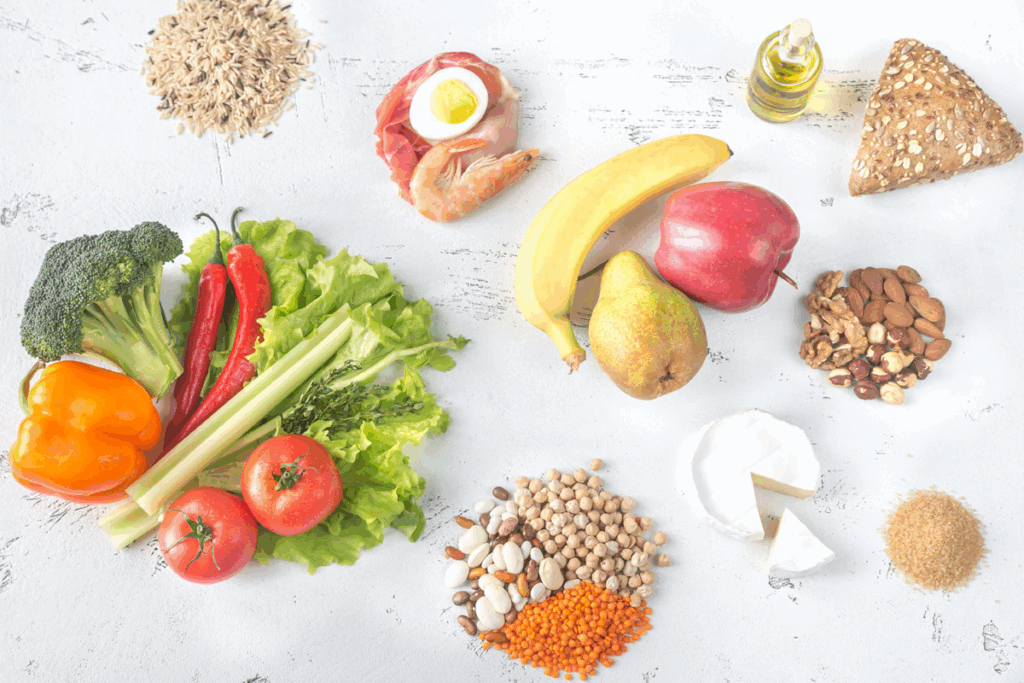
The first week after gastric sleeve surgery is very important for healing. What you eat plays a big role in how well you recover. At Liv Hospital, we focus on your safety and success, following international standards.Your 7 essential steps for your diet following gastric sleeve surgery. This guide provides the best tips for a successful first week.
At first, you should only eat clear liquids. This helps avoid putting too much stress on your new gastric sutures and prevents problems. As you get better, you’ll start eating soft foods and then more solid foods. Knowing about these stages is key to a smooth recovery.

A well-planned diet after gastric sleeve surgery is key for a smooth recovery. It helps avoid complications and supports healing. You need to eat carefully to help your body adjust and lose weight effectively.
After surgery, your stomach changes a lot. It gets much smaller, which changes how you eat and digest food. You must adjust your eating habits to fit your new stomach size.
With a smaller stomach, you can only eat small amounts at a time. You’ll need to eat more often. This also means you have to plan your meals carefully to get enough nutrients.
Your diet after surgery is very important for recovery. You’ll start with a clear liquid diet to ease stress on your new stomach. This helps prevent problems like leakage or blockages.
Sticking to your diet is essential for a good recovery. It helps your body heal and supports long-term weight loss. By following the gastric sleeve eating plan, you can improve your results and lower the risk of complications.

The journey to a new diet after bariatric surgery has different stages. Each stage is key for a good outcome. After gastric sleeve surgery, sticking to a strict diet is vital for a smooth recovery and weight loss.
The diet after gastric sleeve surgery has four phases. These phases help introduce more food gradually. This lets the stomach heal and adjust.
| Phase | Duration | Description |
| Clear Liquid | Week 1 | Clear broths, electrolyte-rich beverages, and water |
| Full Liquid | Week 2 | Thicker liquids, protein shakes, and soups |
| Pureed | Week 3-4 | Blended foods, soft proteins, and vegetables |
| Soft Foods | After Week 4 | Soft, easy-to-chew foods, gradually introducing more texture |
In the first week, a clear liquid diet is required. This phase is vital for stomach healing without solid foods. Allowed clear liquids include water, clear broths, and electrolyte-rich beverages. It’s important to drink slowly and avoid straws to prevent discomfort.
One patient found the clear liquid diet hard but understood its importance.
“I was surprised by how much I learned about my body’s needs during the clear liquid phase. It was a critical step in my recovery.”
Following the diet after gastric sleeve surgery is essential. Not sticking to the diet can cause dehydration, nutrient deficiencies, and stomach pain. It’s important to see the diet as a necessary part of recovery.
By sticking to the diet and staying hydrated, patients can lower the risk of complications. This sets them up for long-term success.
After gastric sleeve surgery, staying hydrated is key for a smooth recovery. Drinking enough water helps prevent dehydration and aids in healing. We’ll cover how to meet your daily fluid goal, approved drinks, sipping tips, and signs of dehydration.
It’s important to drink at least 64oz of fluid each day. This might seem hard, but it’s vital for staying hydrated. Try drinking 8oz of fluid every hour when you’re awake to hit your goal.
| Time | Fluid Intake |
| 8:00 AM | 8oz |
| 9:00 AM | 8oz |
| 10:00 AM | 8oz |
| 11:00 AM | 8oz |
| 12:00 PM | 8oz |
| 1:00 PM | 8oz |
| 2:00 PM | 8oz |
| 3:00 PM | 8oz |
Not all drinks are okay after gastric sleeve surgery. Safe choices include water, clear broths, and drinks like coconut water or sports drinks. Drink slowly to avoid discomfort or nausea. Using sipping techniques can help you stay hydrated without feeling overwhelmed.
Dehydration is a serious risk after gastric sleeve surgery. Signs include dark urine, dizziness, dry mouth, and fatigue. If you notice these symptoms, drink more water right away. In severe cases, you might need to see a doctor.
By focusing on hydration and following these tips, you can lower the risk of dehydration and support your recovery after gastric sleeve surgery.
After gastric sleeve surgery, patients must stick to a clear liquid diet. This diet is key for the first week to keep the new stomach sutures safe. It helps the healing process without any trouble.
Allowed clear liquids are water, clear broths, and sugar-free electrolyte drinks. It’s important to pick liquids that are gentle on the stomach. They should also keep you hydrated and balanced with electrolytes.
The liquids you drink should be sugar-free to avoid dumping syndrome. This is a problem that can happen after surgery. They should also be caffeine-free to prevent stomach irritation. Lastly, choose non-carbonated drinks to avoid discomfort and gas.
Here’s what a day might look like: Start with clear broth in the morning. Drink water throughout the day. Have a sugar-free electrolyte drink in the afternoon. Make sure to drink enough to reach your daily goal of 64oz.
| Time | Liquid Consumed | Amount |
| 8:00 AM | Clear Broth | 4 oz |
| 10:00 AM | Water | 4 oz |
| 12:00 PM | Sugar-Free Electrolyte Drink | 4 oz |
| 2:00 PM | Water | 4 oz |
By sticking to this clear liquid diet, patients can have a smooth recovery. It also helps avoid complications after gastric sleeve surgery.
In the first week after gastric sleeve surgery, making protein a top priority is key for recovery. Protein is essential for healing and keeping muscle mass while losing weight.
Protein helps make enzymes, hormones, and other chemicals needed for healing. It also helps prevent muscle loss from eating fewer calories after surgery. Getting enough protein is important for your health and recovery.
Finding the right protein supplement is important. Look for ones that are low in sugar, caffeine-free, and not carbonated. Whey protein isolate is a good choice because it’s high in protein and easy to digest. Talk to a healthcare provider or nutritionist to find the best protein supplement for you.
To meet your protein needs, learn how to drink protein shakes well. Drink slowly to avoid discomfort. Try spreading out your protein intake throughout the day. Experiment with flavors and temperatures to find what works for you.
By focusing on protein, you help your body heal and set yourself up for successful weight loss and long-term health after gastric sleeve surgery.
To ensure a successful recovery, patients must establish a meal schedule that meets their nutritional needs while minimizing stress on the new gastric sutures.
Eating small, frequent meals is key in the first week after gastric sleeve surgery. This method reduces the risk of complications and ensures enough nutrients. It’s best to eat every 2-3 hours, or as your healthcare provider advises.
A sample meal schedule might look like this:
| Time | Meal/Drink | Nutritional Content |
| 8:00 AM | Protein Shake | 20g Protein, 100 Calories |
| 10:00 AM | Clear Broth | Low Sodium, 50 Calories |
| 12:00 PM | Protein Shake | 20g Protein, 100 Calories |
| 2:00 PM | Electrolyte Drink | Replenish Electrolytes |
| 4:00 PM | Clear Liquid | Low Sugar, 60 Calories |
Tracking your food and fluid intake is vital to ensure you’re meeting your nutritional needs. Use a food diary or a mobile app to log everything you consume. This helps in:
By following this structured meal schedule and tracking your intake, you can significantly enhance your recovery process and set a solid foundation for your future dietary needs.
After gastric sleeve surgery, managing digestive issues is key for a smooth recovery. Patients may face challenges like nausea, gas, and dumping syndrome. These can affect their comfort and health.
Nausea is common after gastric sleeve surgery. To fight it, eat small meals often and avoid nausea triggers. Staying hydrated is also vital to avoid dehydration, which can make nausea worse. If nausea doesn’t go away, talk to your doctor.
Keeping a food diary can help track what makes you feel nauseous. Avoid strong-smelling foods and foods high in sugar or fat to reduce nausea.
Gas and discomfort are common after surgery. To ease these, eat slowly, skip carbonated drinks, and don’t chew gum. Walking and gentle exercise can also help digestion and reduce gas.
Try over-the-counter gas reducers, but check with your doctor first. Keeping a food diary can help find what causes gas and discomfort.
Dumping syndrome happens when food, like sugar, moves too fast from the stomach to the small intestine. To avoid it, avoid sugary foods and drinks and eat small, protein-rich meals. Knowing the symptoms, like cramps and diarrhea, can help you spot it.
If you get dumping syndrome, lie down and rest until it goes away. For severe cases or if it doesn’t stop, see a doctor.
After a gastric sleeve surgery, it’s vital to focus on vitamins for healing and weight loss. A good vitamin plan helps the body get the nutrients it needs, even with a smaller stomach.
In the first week, choose supplements that are easy to digest and full of important nutrients. Multivitamins, vitamin B12, and calcium citrate are top picks. They keep your body balanced and support strong bones.
It’s important to take vitamins and minerals after surgery to help with healing and losing weight. The right supplements depend on your health before surgery and your doctor’s advice.
The type and how you take supplements matter a lot. Liquid or chewable multivitamins are better than tablets because they’re easier to digest. Vitamin B12 injections or sublingual forms work well because they’re absorbed quickly.
It’s also key to take supplements at the right times. For example, taking calcium citrate with vitamin D helps with absorption. Always talk to your doctor about the best way to take your supplements.
Having a schedule for your supplements helps keep things consistent. This schedule should match your meal plan to avoid any problems with absorption.
For example, you might take a multivitamin in the morning, vitamin B12 at lunch, and calcium citrate at night. Being consistent helps make it a habit and ensures you get all the nutrients you need.
By sticking to a good vitamin plan, you can improve your recovery and set a strong foundation for your health and weight loss goals.
As you near the end of your first week after gastric sleeve surgery, it’s time to check if you’re ready for the next diet step. You need to know the signs that show you’re ready to move on. Also, get a sneak peek at what Week 2 will bring. And don’t forget to keep talking to your healthcare team.
There are a few signs that tell you it’s time to advance your diet. These include:
If you’re seeing these signs often, it’s likely you’re ready for the next diet phase.
In Week 2, you’ll start a full liquid diet. This step is key as it gets your stomach ready for solid foods later. A full liquid diet includes:
| Liquid Type | Examples |
| Protein shakes | Unflavored or flavored protein supplements |
| Clear broths | Chicken or vegetable broth |
| Thinned pureed foods | Pureed soups or yogurt |
It’s important to keep your healthcare team updated on your progress. Talking regularly helps solve any problems quickly. Make sure to:
By keeping the lines of communication open, you’ll make the transition to the full liquid diet smoother.
Building a strong foundation for success after gastric sleeve surgery takes dedication. It’s about sticking to a diet and making lasting lifestyle changes. By following the 7 key steps in this guide, patients can have a smooth recovery. They’ll be on their way to lasting weight loss and better health.
A successful recovery starts with following the diet closely. Drinking plenty of water and getting enough protein are also key. As patients move through the four eating phases, staying true to the guidelines is vital. It’s also important to talk to their healthcare team about any issues or challenges.
Creating this foundation helps people live a healthier life and keep the benefits of their surgery. Following the diet and taking supplements correctly helps patients get through the recovery. It sets them up for a stronger, healthier future.
For the first week, a clear liquid diet is best. It helps avoid stress on the new sutures and prevents problems.
Drinking enough water is key to avoid dehydration. It also helps with a smooth recovery. Make sure to drink approved liquids.
You can have sugar-free, caffeine-free, and non-carbonated drinks. Your healthcare team will give you a list of what’s okay to drink.
Protein is vital for healing and losing weight. Your healthcare team will tell you how much to eat.
Sticking to your diet is very important. It helps prevent problems and ensures a good recovery. Always follow your diet plan and go to your follow-up appointments.
To handle digestive issues, eat small amounts often. Avoid foods that upset your stomach. Also, drink plenty of water. Your healthcare team will give you tips on managing nausea, gas, and dumping syndrome.
Taking vitamins and minerals is important for healing and losing weight. Make sure to take them as recommended by your healthcare team.
You can move to a full liquid diet after a week, if you’re ready. Being ready means you can handle clear liquids and drink enough water.
To get ready for eating more, talk to your healthcare team. Follow your diet plan and go to your appointments.
Having a meal schedule is key. It helps avoid stress on your new sutures and prevents problems. Eat small amounts often and keep track of what you eat.
The diet plan has four phases. The first week is clear liquids. Following the plan is important for a successful recovery.
Issues like nausea, gas, and dumping syndrome can happen. To deal with them, eat small amounts, avoid bad foods, and drink lots of water.
Sherf Dagan, S., Goldenshluger, A., Globus, I., Schweiger, C., Kessler, Y., Kowen Sandbank, G., Ben-Porat, T., & Sinai, T. (2017). Nutritional recommendations for adult bariatric surgery patients: clinical practice. Advances in Nutrition, 8(2), 382–394. https://www.ncbi.nlm.nih.gov/pmc/articles/PMC5347108/
Subscribe to our e-newsletter to stay informed about the latest innovations in the world of health and exclusive offers!
WhatsApp us